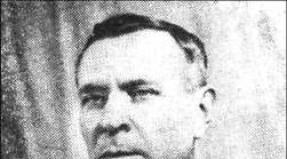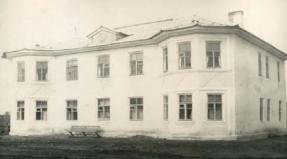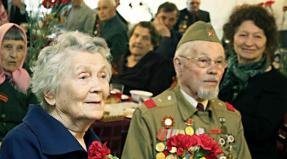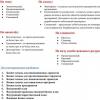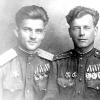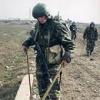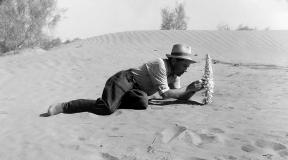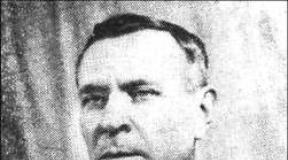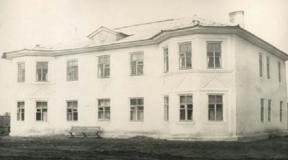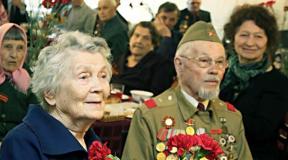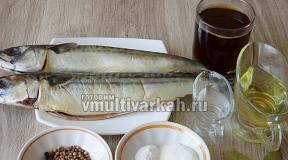Ryabinin Nikolai Vladimirovich. Ryabinin (Sidorov) Nikolai Romanovich Essay-interview about Ryabinin Nikolai Vladimirovich
R Yabinin Nikolai Sergeevich - commander of a machine gun platoon of the 412th Infantry Regiment of the 1st Brest Infantry Division of the 70th Army of the 2nd Belorussian Front, senior lieutenant.
Born on May 5, 1909 in the village of Velikopolye, now Orsha district of the Mari El Republic, in the family of an employee. Mariets. He graduated from junior high school and workers' school in 1930. He worked as an accountant at the Kuat collective farm.
In the Red Army in 1931-1932 and since 1942. He served in the 134th Infantry Regiment of the 45th Infantry Division as a Red Army soldier. Member of the CPSU(b) since 1932. In 1942 he graduated from the Vinnitsa Command Improvement Course (KUKS) in the city of Mozhga, Udmurt Autonomous Soviet Socialist Republic. After the courses according to Art. 65 gr. II Project 336-42 was declared unfit for service with exclusion from registration.
At his personal request, he was left in the army and seconded to the Southern Front, then at the disposal of the personnel department of the Moscow Military District (MVO). He served as deputy company commander for political affairs: until March 1943 - the 40th training machine-gun regiment of the 1st training brigade of the Moscow Military District, until June 1943 - the 38th reserve rifle regiment of the 18th reserve brigade of the Moscow Military District. Until February 1944 he was in the officer reserve of the personnel department of the Western Front.
At the front during the Great Patriotic War from March 1944. He was the commander of a machine gun platoon. He fought on the Belorussian, 1st and 2nd Belorussian fronts. In battles he was wounded twice.
Participated:
- in the Brest-Lublin operation, including the crossing of Pripyat and the liberation of the city of Brest, in the liberation of Poland and the battles on the Narew River - in 1944;
- in the Vistula-Oder operation, including in the battles for the city of Bromberg (Bydgoszcz) and the conquest of the bridgehead on the Vistula - in 1945.The commander of the machine gun platoon of the 412th Infantry Regiment of the 1st Infantry Division, Senior Lieutenant Ryabinin, at the head of a group of fighters, crossed the Vistula northeast of the city of Bromberg (Bydgoszcz, Poland) on January 27, 1945. Having captured a bridgehead on the left bank, the soldiers destroyed up to 2 platoons of enemy infantry. While holding the captured line, on January 28, 1945, he destroyed dozens of Nazis with machine gun fire. In this battle he was seriously wounded.
U Kaz of the Presidium of the Supreme Soviet of the USSR dated June 29, 1945 for the exemplary performance of combat missions of the command on the front of the fight against the Nazi invaders and the courage and heroism shown to the senior lieutenant Ryabinin Nikolai Sergeevich awarded the title of Hero of the Soviet Union with the Order of Lenin and the Gold Star medal (No. 7540).
After being wounded, he was treated in various hospitals until 1946, and became a group 1 disabled person - his arm was amputated. After being demobilized from the army, he lived in Moscow. He worked as a military instructor in one of the schools in the Krasnogvardeisky district. Died March 2, 1975. He was buried in Moscow at the Lublin cemetery (site 33).
In the city of Yoshkar-Ola, a street was named after him and a memorial plaque was installed.
Awarded the Order of Lenin (06/29/45), Red Star (08/14/44).
In 1930, Nikolai Ryabinin graduated from the workers' faculty and began working as an accountant at the Kuat collective farm in the Orsha region of the Mari Republic. In 1931-32, he served in military service as a Red Army soldier in the 134th Infantry Regiment of the 45th Infantry Division, there he joined the ranks of the Bolshevik Party, and returned to his native collective farm. A family appeared - a wife and three children. Normal life was hampered by frequent illnesses, which Ryabinin struggled with in every possible way.
After the start of the Great Patriotic War, Ryabinin was not immediately drafted into the army again because of his medical record. Only in February 1942 he was sent to the Vinnitsa KUKS, evacuated to the Udmurt city of Mozhga. But even after them, having become a lieutenant 3 months later, Ryabinin was declared unfit by a medical commission with a recommendation for dismissal. An order was even issued to this effect.
But in some unthinkable way, Lieutenant Ryabinin in May 1942 was seconded to the personnel department of the Southern Front, where he remained until the end of June. Then he was sent to a training unit in Moscow, where he served first as a political instructor and then as deputy commander of a training company for political affairs in a number of training units.
In February 1944, Lieutenant Ryabinin was appointed commander of a machine gun platoon of the 412th Infantry Regiment of the 1st Infantry Division of the 70th Army of the Belorussian Front. After heavy fighting on the Oryol Bulge in the summer of 1943, the army was in reserve and was engaged in formation in the rear. Only in April 1944 did it become part of the 1st Belorussian Front, and its formations began to concentrate on the front line along the southern bank of Pripyat in Volyn. In May 1944, Ryabinin received the rank of senior lieutenant.
Senior Lieutenant Ryabinin received his baptism of fire in tactical battles in June 1944. And already on July 17, 1944, an offensive began on this section of the front during the Brest-Lublin operation. Ryabinin's machine gun platoon took part in crossing Pripyat near the village of Ratno and conquering a bridgehead on the northern bank of the river. From this bridgehead, the troops of the 70th Army launched an attack on the city of Brest. Ryabinin's machine gun platoon took part in the battle for the Malorita station and in street battles in Brest. Moreover, the machine gunners, together with the riflemen, cleared 9 city blocks of the enemy and reached the Western Bug River in the area of the Brest Fortress. For his distinction in these battles, Senior Lieutenant Ryabinin was awarded the Order of the Red Star.
In August 1944, the division in which Ryabinin fought liberated the territory of Poland. His machine gunners, with their devastating fire, contributed to the capture of the settlement of Losice and the Jadow station. But on September 1, 1944, on the approaches to the Narev River, Senior Lieutenant Ryabinin was wounded in the left shin and was treated in the medical battalion.
From the bridgehead on the Narew, already as part of the 2nd Belorussian Front, the troops of the 70th Army in January 1945 went on the offensive during the Vistula-Oder operation. Ryabinin’s machine gunners took part in the battles for the village of Racenz, together with the riflemen crossed the Drwentse River and reached the Vistula near the city of Bromberg (Bydgoszcz).
On the evening of January 27, 1945, a rifle company of the 412th Infantry Regiment, with a machine-gun platoon of senior lieutenant Ryabinin attached to it, quickly crossed the Vistula across the ice and in battle captured a small bridgehead on its bank. The company commander died in hand-to-hand combat, and Ryabinin took command of the combined group. When capturing the enemy's trenches, up to 40 fascists were destroyed. In this battle, Ryabinin was wounded, but continued to command the unit.
On the morning of the next day, January 28, 1945, the enemy threw large forces into the bridgehead, numbering up to an infantry regiment with the support of tanks and artillery. A heavy, bloody battle ensued. Ryabinin's fighters fought to the death, stubbornly holding the conquered bridgehead. At a critical moment, when the Nazis seemed about to break into the paratroopers’ positions, the platoon commander himself lay down behind the machine gun, replacing the deceased machine gunner, and began mowing down the Nazis with well-aimed bursts. His fire was so devastating that up to 50 enemy corpses remained in the snow before the Nazis rolled back. The machine gunner's position was hit by several artillery pieces and mortars. One mine exploded almost next to Ryabinin. The group commander received multiple injuries and was evacuated across the river. But the fighters of Senior Lieutenant Ryabinin completed the task, defending the bridgehead, to which other units of the 1st Infantry Division crossed and began fighting for the city of Bromberg. For the courage and heroism shown during the crossing of the Vistula, senior lieutenant Ryabinin was nominated for the title of Hero of the Soviet Union.
At evacuation hospital No. 4845, doctors saved Ryabinin’s life by removing 11 fragments from his body. But he developed gangrene from a wound in the elbow. The left arm had to be amputated. Here he was treated until December 1945, and here he learned from the newspapers about his high award. In 1946, he arrived in Moscow, where he was awarded the Order of Lenin and the Gold Star medal in the Kremlin.
After the war, disabled person of the 1st group N.S. Ryabinin began working as a military instructor in one of the Moscow schools and lived after the war for 30 years...
Ryabinin Nikolay Alexandrovich
Nikolai Aleksandrovich Ryabinin was born in 1885. After graduating from the shipbuilding department of the St. Petersburg Polytechnic Institute, in 1909 he entered the 2nd Baltic Fleet Crew as a cadet and was transferred to the Marine Engineering School of Emperor Nicholas I. In 1910, midshipman Ryabinin received the first officer rank of midshipman and assignment to the Black Sea Fleet. Having received excellent training and having two higher education diplomas, the young officer was enrolled in the fleet headquarters and appointed assistant to the commander of Admiral A.A. Eberhard. Ryabinin did not like to sit too long on the shore and tried to go out to sea at every opportunity. He was soon promoted to lieutenant, and then appointed head of one of the departments of the fleet headquarters, where he showed his talents in the hunt for the Goeben.In the summer of 1914, a few days before the start of the war, Germany sent two of its best warships - the battle cruiser Goeben and the light cruiser Breslau - to the aid of the Ottoman Empire, its faithful ally. Although both of them were called cruisers, the Goeben was actually a powerful fast battleship. In speed it was superior to all the battleships of the Black Sea Fleet of the Russian Empire, and in terms of its armament - 10 280-mm guns - it was capable of fighting the three strongest Russian ships on the Black Sea at once. “Breslau” was a high-speed reconnaissance aircraft, which in our fleet could only be overtaken by destroyers, from which the “German”, taking advantage of its superiority in weapons, could always easily fight off.
Powerful weapons and high speed made the German duo the most dangerous rival for the Black Sea squadron. At the very beginning of the war, the Goeben and Breslau fired at several Russian cities, including the Sevastopol naval base, sinking several ships and vessels, and managed to escape with impunity.
Only the three best Russian battleships on the Black Sea could stop the German cruisers - the same type "St. Eustathius", "St. John Chrysostom" and "St. Panteleimon" (formerly "Potemkin", renamed after the sailors' uprising), which together carried 12 guns of 305-caliber. mm. However, in terms of speed, they were almost half as fast as the Goeben and, moreover, in order not to be destroyed, they had to act exclusively together.
Well aware of the true state of affairs, the Germans (formally, Turkish flags were raised on the German cruisers, but the crews remained German, and the admiral of the Kaiser's fleet was in command) felt like kings of the Black Sea. The new Russian dreadnought battleships were still being completed, so it was urgently necessary to figure out how to fight back the Goeben.
As a result, the officers of the Black Sea Fleet headquarters, among whom the head of the administrative department, Lieutenant Nikolai Ryabinin, played a prominent role, developed a plan for a trap on the high seas. The high-speed destroyers had to detect enemy ships and direct them towards the battleships moving in a single column.
This idea was realized only in 1915. The German cruisers, who behaved frankly insolently, discovered the destroyers, fired at them and rushed in pursuit. Russian destroyers, including the Captain Saken, on board of which was N. Ryabinin, who was supporting the operation, dodging shell explosions and moved on a pre-agreed course - straight towards the German armored detachment. But the appearance of the Goeben battleships did not frighten us at all. The Germans knew that if they increased their speed, they would manage to get to a distance beyond the reach of enemy guns before the Russian gunners had time to take aim.
However, the Goeben team was in for an unpleasant surprise. The lead “Saint Eustathius” fired so quickly and so accurately that several of its main caliber shells managed to hit the German battle cruiser. As a result, “Goeben” managed to escape, but he lost several dozen people killed. The Germans lost their arrogance, and henceforth they acted with great caution.
Soon, the Black Sea Fleet included new battleships “Empress Maria” and “Empress Catherine the Great”, each of which was superior to “Goeben” in armament and thickness of armor. True, the German battlecruiser was still faster, but this advantage became less obvious. In 1916, “Goeben” was again lured into almost the same trap, leading it to “Catherine the Great”. The Germans fled again, but were surprised to discover that the Russian battleship was much faster than they thought.
Having opened fire from the maximum distance, “Catherine the Great” accelerated more than expected even according to the project. A Russian 305-mm shell again hit the Goeben, which this time barely managed to escape into the Bosporus. From then until the end of 1917, the Goeben ingloriously hid in a Turkish port, and Russian ships completely dominated the Black Sea. "Breslau", in the end, was blown up by mines and sank.
Lieutenant of the Black Sea Fleet Nikolai Ryabinin
For his distinction in the unprecedented hunt for the Goeben, senior lieutenant Nikolai Ryabinin was awarded the Order of St. Vladimir IV degree with swords and a bow - an honorary military award, and then promoted to captain of the 2nd rank “for distinguished service.”
Nikolai Ryabinin did not accept the revolution of 1917, as well as the power of the Bolsheviks. In 1918, he became commander of the white transport flotilla on the Caspian Sea, and in August 1919 - chief of staff of the entire Caspian flotilla.
At the beginning of 1920, the Commander-in-Chief of the Armed Forces of the South of Russia, General Anton Denikin, appointed Nikolai Ryabinin as chief of staff of the Black Sea Fleet with promotion to captain of the 1st rank. But the hero of the confrontation with the Goeben did not have the chance to lead the white fleet on the Black Sea for a long time. After Denikin’s resignation, Ryabinin, at a meeting of the Military Council in Sevastopol, spoke out against the appointment of General Baron Wrangel as the new commander, for which he was removed from office and dismissed from service. After that, the honored military officer worked as an assistant captain on the civilian steamer Lazarev. After the capture of Crimea by the Reds, Ryabinin refused to leave Russia and become an emigrant.
Surprisingly, he was not only not shot, but was even allowed to go to Finland, where Ryabinin’s parents lived at that time. Nikolai Alexandrovich did not want to enjoy a well-fed and calm life abroad. He achieved Soviet citizenship. After this, Finnish nationalists tried to kill Ryabinin. It was only by miracle that he survived the assassination attempt and returned to Soviet Russia.
Soon he was assigned as a “military expert” in the Workers’ and Peasants’ Red Fleet. In 1923, he even became the head of the Mobilization Department of the Operations Directorate of the RKKF headquarters, but after a year and a half in 1925, the former tsarist officer was “purged” from the navy.
The former chief of staff of the fleet became a foreman at the Marti shipbuilding plant in Nikolaev, and then received a position in the Nikolaev regional executive committee. But the GPU did not leave him alone. In December 1929, Ryabinin was arrested by officers of the district department of the GPU, accused of counter-revolutionary activities, and in 1930 sentenced to five years in forced labor camps. In the spring of 1934, the former military sailor received his freedom, but he was prohibited from living in the capital and regional cities. Then he found a job in Gorokhovets. But even here the “organs” did not leave him alone.

House of engineering and technical personnel of the Gorokhovets Shipyard on the street. Kirov, where N. Ryabinin lived his last years of freedom
In May 1934, shipbuilding engineer and experienced sailor Nikolai Aleksandrovich Ryabinin was appointed technical director of the Gorokhovets Shipyard. Under his leadership, river barges, pontoons and tugs were built in Gorokhovets on the Klyazma. The authorities could not be happier with a specialist of such a high level. Under Ryabinin, the Gorokhovets Shipyard, later renamed a shipbuilding plant, consistently exceeded the plan, launching several dozen different watercraft each season.
However, the local NKVD could not forget Ryabinin’s officer past and his service in the White Army. During the mass repressions in the sadly memorable 1937, N.A. Ryabinin was arrested right at his workplace. This happened on September 4, 1937. And few people knew that this “enemy of the people” was a hero of the fight against the German cruisers Goeben and Breslau for dominance in the Black Sea during the First World War...
According to data released by the Vladimir regional department of the KGB during the years of perestroika, citizen Ryabinin was sentenced in 1938 to 10 years in the camps without the right to correspondence. In practice, such a formulation most often meant execution. This happened with the former author of the operation to hunt for “Goeben”. As it turned out, on September 30, 1938, Ryabinin was shot in the city of Ivanovo, the regional center of that time.
In 1958, Nikolai Aleksandrovich Ryabinin was posthumously rehabilitated - “for lack of evidence of a crime.”
Experience of combat operations against the Goeben and Breslau, which were developed by the talented naval officer N.A. Ryabinin, is still studied in the academies of the leading maritime powers...
Nikolay FROLOV. “Gorokhovetsky shipbuilder - hunter of the Goeben and Breslau”
Copyright © 2018 Unconditional love
Ryabinin Nikolay Alexandrovich(1885-1938) captain 2nd rank. Born in Finland. He graduated from a three-year city school, then from the Commercial School (1905) and the St. Petersburg Polytechnic Institute (shipbuilding department in 1909). On June 22, 1909, he was enrolled as a cadet in the 2nd Baltic Fleet Crew and on September 10 of the same year he was transferred to the Marine Engineering School of Emperor Nicholas I. By Order of the Naval Department 89, on April 18, 1910, he was transferred to naval midshipmen. After an examination, he was promoted to midshipman and in December 1910 enlisted in the Black Sea Fleet Crew. From 1910 to 1917 he served in the Black Sea Fleet. For the courage shown in the battle with "Goeben", he was awarded the Order of St. Vladimir, 4th degree with swords and bow. In 1916 he was awarded the rank of senior lieutenant. On September 23, 1917, he was promoted to captain 2nd rank for “distinction in service.”
In March 1918, with part of the fleet, he came to Novorossiysk, where he continued to remain until the city was occupied by the Volunteer Army. He entered service in the naval department in the All-Russian Socialist Republic on May 3, 1919 and was enrolled in the reserve of ranks. In August 1919, he became commander of the Caspian transport flotilla, and then chief of staff of the Caspian flotilla. On February 12, 1920, he was appointed chief of staff of the Black Sea Fleet in place of Rear Admiral Bubnov, who was dismissed by order of General Denikin for supporting the candidacy of General Wrangel for the post of commander in the Crimea. In March 1920, at the Military Council in Sevastopol, assembled on the orders of General Denikin, he spoke as an active supporter of General Wrangel and was the first to mention his name. In the same month, an attempt was made on Ryabinin’s life by a group of officers led by Captain 2nd Rank Kislovsky, as a result of which he was wounded in the head.
On April 16, 1920, at a meeting of representatives of fleet ships, Ryabinin proposed sending everyone who wanted to leave Russia to Turkey, and then handing over the ships to representatives of Soviet Russia. Two hours later he was removed from his post by General Wrangel for his defeatist mood. On April 18, 1920 (according to his autobiography with his service record compiled in the RKKF) he was removed from office and dismissed from service. He worked as one of the captain's assistants on the steamship of the Russian Society of Shipping and Trade (ROPIT) "Lazarev". On November 14, 1920, he remained (having sent his family to Constantinople) of his own free will in Sevastopol and placed himself at the disposal of the red command. In 1921 Ryabinin N.A. returned to Finland, where his parents lived, and worked as a senior worker on Spiridonov’s estate.
In November 1922, by decree of the All-Russian Central Executive Committee, he was restored to Soviet citizenship. In the spring of 1923, he returned to the USSR after an attempt on his life by Finnish fascists. By Navy Order No. 978 dated November 10, 1923, he was enlisted in naval service. On October 21, 1923, he was appointed assistant to the head of the organizational part of the combat department of the Naval Headquarters of the RKKF. On November 14, 1923, he was appointed head of the Mobilization Department of the Operations Directorate of the RKKF headquarters. On April 9, 1925, by order of the RKKF personnel, he was transferred to the reserve, “due to the impossibility of appropriate use.” In 1924, Grigorenko S.A. was married for the second time to a resident of the city of Nikolaev. From May 4, 1925 to 1926, he worked as a foreman at the shipbuilding plant named after. Marty in Nikolaev. From 1926 to 1929 worked in various positions in the regional executive committee of the city of Nikolaev.
In 1930, he was arrested by the Nikolaev district department of the GPU, by a verdict of the board on the basis of Art. 58th Criminal Code, sentenced to 5 years in forced labor camps. In the spring of 1934 he was released early. Due to restrictions on places of residence, he was forced to move with his family to the city of Gorokhovets, Vladimir region. Since May 3, 1934 Ryabinin N.A. worked as technical director of the Gorokhovets Shipyard.
On September 4, 1937, he was arrested for the second time and sentenced to 10 years in the camps without the right to correspondence. According to the archives of the Vladimir KGB, he was shot on September 30, 1938 in Ivanovo. The burial place is unknown. In 1958, Nikolai Aleksandrovich Ryabinin was posthumously rehabilitated for lack of evidence of a crime.
Research
on this topic:
Introduction_ ____________________________________________ 3 pages.
I chapter. Poet Nikolai Ryabinin _________________________ 4 pages
II chapter. "Teacher! What a word!” ____________________ 9 pages
Conclusion ___________________________________________ 16 pages.
Bibliography _________________________________________ 17 pages
Introduction.
When I first heard the name of Nikolai Ryabinin in literary local history classes, I learned that he was not only a famous Ulyanovsk poet, a member of the Union of Writers of the USSR, but also that he worked for 17 years as a teacher at the Tetyushskaya secondary school, where I study, and taught Russian language lessons and literature.
Therefore, the choice of the topic of work was dictated by my interest in a man of great soul, a bright creative personality, like Nikolai Ryabinin.
I consider the topic of my work to be relevant, since studying one’s native land is the most important component of spiritual, moral, patriotic education.
And love for the Fatherland begins, first of all, with love for the “small homeland” - the region, city, village, village, place in which you were born and raised.
Therefore, it is necessary to preserve the historical and cultural heritage of our region.
The information I received as a result of the research can be used in literature lessons, extracurricular activities, as well as in the Museum Studies club.”
Goal of the work: studying the biography and creativity of a fellow countryman poet.
Tasks:
Deepen knowledge about the life and work of the Ulyanovsk poet Nikolai Ryabinin;
Study periodicals about Nikolai Ryabinin;
Conduct research on the activities of Nikolai Romanovich Ryabinin (Sidorov) during the period of his work as a teacher at the Tetyushskaya secondary school.
I. Poet Nikolai Ryabinin.
 Nikolai Romanovich Ryabinin (real name Sidorov) was born in 1918 in the remote village of Ermolovka, Luninsky district, Penza region. He began writing poetry since his school years, when many at that time tried their hand at poetry.
Nikolai Romanovich Ryabinin (real name Sidorov) was born in 1918 in the remote village of Ermolovka, Luninsky district, Penza region. He began writing poetry since his school years, when many at that time tried their hand at poetry.
After graduating from school, Ryabinin entered the Ulyanovsk Pedagogical Institute and continued to write poetry. Once he signed his poems with a pseudonym - Ryabinin. These poems were published. And since then, Nikolai Romanovich signed all his poems with a pseudonym.
Why Ryabinin? Probably because this tree reminded him of his father’s house, his childhood, and he wrote about this in his poem “Rowan”.
Whatever you want, this tree is nice to me:
From my infancy I grew up under his tabernacle.
I can still see it: it was engulfed in fire,
Like my father's hut on fire.* 1
The first works appeared in print in the forties, when I was in my third year. There were so many plans and ideas, but everything ended in an instant: the war began. At the age of 22 he went to the front. He fought on the Karelian front since the most terrible summer of '41. He fought in mortar units in the Arctic, in difficult conditions of the tundra. He was a gunner, mortar commander, and deputy political instructor. After completing the course in July 1945, he was appointed commander of a mortar platoon and participated in the war with Japan. While on the front-line fields, he did not forget about poetry. Something appeared in the front-line newspapers “Sentinel of the North”, “Into the Battle for the Motherland”, “For the Glory of the Motherland”.
He was demobilized in 1947 and returned to the Volga region. Graduated from the Pedagogical Institute. He first taught in the village of Baranovka, Nikolaevsky district, from 1948 to 1952 - head teacher of the Krasnoborsk secondary school, Veshkaymsky district. He worked as a teacher at a secondary school named after Lenin, and as an employee at regional radio broadcasting.
From 1955 to 1972 - Tetyushskaya secondary school, and from 1972 he switched to literary work.
Nikolai Romanovich raised a garden, raised two sons of whom he could be proud, wrote books, taught, educated many students while working as a school teacher.
The work of a teacher of Russian language and literature could not but be reflected in the poet’s poems. After all, if every day you communicate with Pushkin, Lermontov, Blok, Yesenin, then you strive for perfection in your work.
Having walked the roads of war, seeing the horror and chaos that reigned all around, the author, of course, could not help but reflect military themes in his work.
Ryabinin writes about the war with that deep restraint that gives the word the freedom to grow in breadth and depth, to spaciously spread out its semantic branches.
What was the worst thing in the war?
Villages on fire?
Are the funnels black?
No, the worst thing was
When there was only one stove in the steppe,
Didn't warm anyone
She was freezing in the wind...
…Alone...alone... Left out of work,
Stripped naked by the fire,
The stove stood and looked into the distance with longing,
The busy hostess was waiting.* 1
The poems of Nikolai Ryabinin, no matter what he writes about, are always deeply humane - and this, perhaps, is their main advantage. The poet most often speaks not about himself, but about what is painfully dear to everyone’s heart. Working people who are in love with their work is another of the themes of Nikolai Ryabinin’s work.
Nikolai Ryabinin found constant inspiration and poetic images for his poems nearby, at hand, they were given to him by their native land and the wise, non-vain people living on it
*1 - N. Ryabinin. Winter. Saratov. Volga Book Publishing House: - 1982 – p. 54
His poems are lyrical and heartfelt. With what sincerity he writes about nature, where most often admiration of its beauty turns into love for his native land, the Motherland.
What I see: at my feet
The first thawed patch is getting dark.
The hole is small, round
On an old fur coat of February.
In that hole the earth is visible,
Her living body is dark.
Well, that means the fur coat is fragile,
The skinny thing is about to fall off your shoulders.
And we will be surprised: beauty
She was wearing it!* 1
The moral theme runs through the poet’s work as a red line: “Indifferent”, “We parted ways and became city dwellers”, “Parting with the huts”,
“Asphalt for you, so that your heels can click.” They express regret that people are leaving villages and moving to the city. There they no longer need not only peasant labor, the land that fed them, but even poetry. Nikolai Romanovich himself was in no hurry to move to the city. He moved to the regional center only when he retired. But he himself never forgot about his roots and urged readers not to forget about it.
Our roots remain in the village, Only you don’t keep a pedigree:
This is where your lineage begins. It’s still known that he’s not a prince,
There, in the village, is your ancient grandfather, your blood relative, the pitiful plowman,
Or grandma may live. Smerd, kneading the dirt with his bast shoes.
Or some uncle remained. But bow to the memory of your ancestor:
But there is no village kinship - Bread grew on his strip!
Could you, looking at the genealogy, And grasp this truth firmly:
Find his trace in the old days. We are all country people.* 2
*1 - N. Ryabinin. Winter. Saratov. Volga Book Publishing House: - 1982 – p. 37
Remembering Nikolai Romanovich, Vladimir Dvoryanskov writes that Ryabinin “was by nature an extremely modest and conscientious person and treated his work very strictly, with exaggerated demands.
...when the good news was brought to his steppe village that he had been accepted into
members of the Writers' Union, he sincerely did not believe it: “For what? How's that? Not at all
this might be the case." And then he wilted, became stern and said to his poet friend: “This,
 probably a joke? You just can’t joke so cruelly...” *1
probably a joke? You just can’t joke so cruelly...” *1
But then he was actually accepted into the professional creative union. They accepted him when he was already over forty and when he was already a mature, mature lyric poet.”
Nikolai Romanovich Ryabinin loved life, loved to breathe the air of his homeland. Unfortunately, fate did not give him much time. Front-line battles and roads took their toll.
Once there was a meeting at the Writers' Union. Suddenly Nikolai Romanovich felt bad. They called an ambulance. Doctors diagnosed him with a stroke. Unfortunately, the front-line soldier, who defeated a formidable enemy, was unable to cope with the insidious illness.
There are trees and grass in the cemetery,
Flocks of cheerful birds are restless,
And I wander and say sad words,
I read the words of mourned love.
Everyone had their own destiny.
Here is the grave of an old man.
In the village there is no new hut -
He erected walls and rafters there.
*1 – V. Dvoryanskov. Late review. // Monomakh. - Ulyanovsk: OSU “United Editorial Office”, - 2007, No. 2 – p.18
And here, where it’s like white milk
The spring bird cherry was doused,
Under a low fresh tubercle
The woman who milked our cows is sleeping.
And here, look, everything is flowers, flowers.
Children bring them to this hill.
Teacher, quiet worker, and you,
And you, my friend, did not live in the world for nothing.* 1
He is not with us. But the poems he wrote and suffered through could teach the past and will be able to teach the future generations a lot.
*1 - N. Ryabinin. Winter. Saratov. Volga Book Publishing House: - 1982 – p. 10
II. "Teacher! What a word!”
My village is originally Russian,
Built a long time ago
But it has a strange name - Tetyushskoe,
Listen: it whistles.
And since - not tea and not coffee -
I was happy with the raw grass
Curly, with an African profile
Cheerful young gentleman.
And he looked around: “Yes, Tetyushskoe...”
He couldn't help but say this:
Very ours, very Russian
A village among steppe roads!* 1
Nikolai Ryabinin’s poem dedicated to the village of Tetyushskoye sounds so emotional and heartfelt. And this is no coincidence. After all, it was this village that he considered his second homeland; Nikolai Romanovich lived and worked here as a teacher of literature and Russian language for 17 years from 1955 to 1972.
Teacher is a holy word. And with this kind word you remember those teachers who left a noticeable mark on the child’s soul and were able to win the respect of their colleagues.
Nikolai Romanovich was just such a teacher, possessing the power of influence on his students, able to instill in them not only interest, but also love for his subject.
When he crossed the threshold of the Tetyushskaya secondary school, he was met here by a friendly team of teachers led by the director Isakov Ivan Vasilyevich.
At that time, Anna Mikhailovna Dolgova taught geography.
“Nikolai Romanovich was a very modest person, an excellent teacher,
*1 - N. Ryabinin. Winter. Saratov. Volga Book Publishing House: - 1982 – p. 26
The children loved him and the villagers respected him. He did not like increased attention to himself. He loved nature and naturalness. I devoted all my free time to poetry.”
 Nina Anatolyevna Guryanova, a mathematics teacher, came to the school when Nikolai Romanovich was already working there.
Nina Anatolyevna Guryanova, a mathematics teacher, came to the school when Nikolai Romanovich was already working there.
“In 1956, I came to work at the Tetyushskaya secondary school, and Nikolai Romanovich Sidorov, a teacher of Russian language and literature, worked as the head teacher at that time. The first thing that surprised me when I met was his hospitality: I went to his apartment, his wife Maria Nikanorovna fed me delicious pies.
N  Ikolay Romanovich was a teacher from God, I went to his lessons, for me these visits were tantamount to visiting the theater. He knew all the poems by heart, be it Pushkin, Lermontov or Mayakovsky, Yesenin. How he read them! I sat in class with my mouth open, and the students listened so attentively. I don’t know how “modern” students would love literature. I still remember literary evenings dedicated to Sergei Yesenin, Blok, Mayakovsky. Then we had subject weeks, and evenings were held for each subject.
Ikolay Romanovich was a teacher from God, I went to his lessons, for me these visits were tantamount to visiting the theater. He knew all the poems by heart, be it Pushkin, Lermontov or Mayakovsky, Yesenin. How he read them! I sat in class with my mouth open, and the students listened so attentively. I don’t know how “modern” students would love literature. I still remember literary evenings dedicated to Sergei Yesenin, Blok, Mayakovsky. Then we had subject weeks, and evenings were held for each subject.
Nikolai Romanovich was not only a wonderful teacher and head teacher, but also a family man. At that time, men - aunts - looked askance at him because he went for water, bread, and hung out laundry - this was considered not a man’s business. He loved his wife and helped her in everything, and since she was a teacher, he knew what that meant.” Sidorova Maria Nikanorovna
Together with Nikolai Romanovich and his wife, Maria Nikanorovna, Anna Fedorovna Savelyeva worked as a literature teacher (now on a well-deserved rest). This is how she remembers this time.
“The Sidorov family was modest. Although they were hospitable, they did not have close, bosom friends; they maintained even, good relations with everyone. Nikolai Romanovich was not a big drinker, and during the war he had a cold in his kidneys, so there was never any alcohol in the house. Nikolai Romanovich was a kind, generous man, he loved to walk along the edge of the river and write poetry.
His students learned that he wrote poetry only when a note about him appeared in some newspaper and his poems were published.
He rarely spoke at any meetings, saying that he had no time, he needed to write poetry. But when he did have a chance to speak, everyone present listened to his speech and did not notice how time flew by.”
My village school
My Ermolovsky first teacher!..
I've seen other lands
I am now a different resident of the area.
But everything seems: here he comes
Early in the morning along our street,
The man is amazing
He gave everything in his life to his children.
Simple, there seems to be no erudition,
In a fur coat, like a man, in a malakhai.
We follow him, without stopping,
Only in class then it became quiet.
And the teacher - how happy he is with everything -
Straightens his hunched shoulders.
And all the “hello!” - everyone to him
Strives to bow when meeting.
Your cheeks are burning hot from the cold.
The crowd in class fell silent.
You can only hear the feathers creaking,
Paper rustles under your hands.* 1
The older generation: former students, teachers still remember his literature lessons.
What needs to be done to prevent reading a literary and artistic book from becoming a burdensome task? And this is where love comes to the fore. Love for your business. You cannot teach to love what you yourself do not love or do not know how to love.
Nikolai Romanovich’s love for his subject was so great that he literally infected the children with it.
The former director of the school, Semenov Ivan Dmitrievich, recalled:
“I worked with Nikolai Romanovich for a long time, and for me, first of all, he was a teacher. In this regard, Sidorov is an exceptional person. He was excellently prepared methodologically, had an excellent knowledge of literature and knew how to present any literary work to his students. Once I attended Nikolai Romanovich’s lesson on the topic “Review of Soviet poetry during the Civil War.” If you listened to how he read Bagritsky’s poem “Duma about Opanas.” I was sure that after such a lesson, the children became interested not only in the works of this poet, but also in his life. And this is very important for both better understanding and broadening the horizons of schoolchildren. Well, and the poems... This, to use Sholokhov’s language, is “his wonder.” And without it there is no man.”
A true teacher is remembered for life. When the teacher himself is on fire, only then will he be able to light up his students. Absolute knowledge alone is not enough for this. It just needs to burn!
Nikolai Romanovich raised and graduated more than one generation of children, in whom he instilled a love for great Russian literature. I would like to cite the memories of some of N.R. Sidorov’s students
“In grades 8-10, Nikolai Romanovich Sidorov taught literature. I loved literature. He explained things interestingly and taught me how to write essays. The best essays were read aloud. He didn’t shout, he didn’t swear, he was upset when he didn’t know the lesson. I remember how the head teacher came to class, and Nikolai Romanovich asked me, hoping that I knew, but for some reason I didn’t learn. And now I can imagine how confused he looked. That's how I let him down. We went to a literary circle, but Nikolai Romanovich never talked about writing poetry, but we knew about it, but we were never curious.”
(Moskaleva Valentina Petrovna)
“I remember my school years (50-60), my peers, a large group of teachers, including my literature teacher and class teacher Nikolai Romanovich Sidorov, the famous poet Ryabinin. Before my mind’s eye stands a tall, thin man with gray hair and a thoughtful look in his gray eyes. He was a deeply decent person, a true intellectual - a bearer of knowledge and culture, an excellent teacher, moderately demanding and friendly.
In literature lessons, in addition to the compulsory material, Nikolai Romanovich introduced us to the latest prose and poetry, sought to instill an interest in reading serious literature, and involved us in discussing works. He tried to develop his students’ reading taste and independent judgment, and recommended reading art magazines.
Nikolai Romanovich was a very modest person; I don’t remember him reading his poems at school. I learned about them from the literary pages of district and regional newspapers, and then from published collections.
Our class hours often took the form of confidential conversations. Under his leadership, scripts were prepared and staged, and reading competitions were held.
I had to work for some time with a poet teacher at our school. He was highly respected by both students and teachers and was my ideal.
Ryabinin’s poetry is a memory of a wonderful man, teacher, poet.”
(Chemistry teacher Belyaeva A.N.)
Nikolai Romanovich Sidorov organized many interesting events. In those days, schoolchildren often met with famous people not only from the village of Tetyushskoye, but also from the region. There was even a meeting with a participant in the civil war, M.I. Samarkin, who came from Ukraine. He took part in the liberation of Simbirsk from the White Guards, and personally knew the hero of the civil war, Guy Dmitrievich Guy.
And in 1967 there was a big meeting with Ulyanovsk writers and poets. The name of the meeting - “Poems, scorched by war” - was suggested by Andrei Tsarev, who brought to the school the famous writer, author of the book “Clouds Are Going to the Wind” N. Karpenko, playwright, author of the play “There is No More Beautiful Destination” V. Dedyukhin and artists of the regional philharmonic society. The meeting was lively and interesting. Famous guests read their poems, shared memories, artists gave songs and romances.
 But the most vivid memory of former teachers and students is the school teachers' theater. And the director of this theater was none other than Nikolai Romanovich.
But the most vivid memory of former teachers and students is the school teachers' theater. And the director of this theater was none other than Nikolai Romanovich.
It all started with the fact that a play was staged for some holiday, everyone liked it and wanted more. Amateur artists performed performances not only in the village of Tetyushskoye, but also in neighboring villages.
N.R. Sidorov never boasted that he wrote poetry, much less showed that he was a poet. He didn’t stand out for anything except his high culture and attention to every person.
Fate brought Alexander Mikhailovich Bogatov together with Nikolai Romanovich Sidorov within the walls of the Tetyushskaya secondary school.
“I didn’t know that I ended up in a team where the poet works. One day, a rumor spread throughout the village that Nikolai Romanovich Sidorov would appear on regional television. He will read his poems. Then the first televisions had just appeared, and we, teachers, huddled around the black and white screen. We didn't have to wait long. Short news, and a poet appeared before us. He behaved calmly, although, as he later found out, this was his first performance. He said a few words about himself and began to read poetry. Such stories were regularly broadcast on local television back then. But the meeting with the poet was connected with the fact that a collection of his poems, “Cranes,” had recently been published. This was in the fall of 1960."
 Nikolai Ryabinin loved rural nature. He often walked through fields, meadows, behind vegetable gardens, wandered along the Trofimovka River and composed his poems there.
Nikolai Ryabinin loved rural nature. He often walked through fields, meadows, behind vegetable gardens, wandered along the Trofimovka River and composed his poems there.
The river is called Trofimovka...
Once upon a time, they say, there lived Trofim,
listened to the robin singing in the bushes,
as the swallow chirps above him.
I dug up roadside linden trees,
cleaned springs along the ravines
and earned ridiculous fame -
the mischievous people cackled after him.
Like, again the blessed one with a shovel.
Well, dig, Trofimushka, dig!
And the water is pinkish from the sun,
the springs were bubbling over the edge.
And jingling keys flocked
from everywhere for the time being
a real river did not arise,
the clouds didn't float in the river! *1
The years spent in the village turned out to be the most fruitful.
During his seventeen years of stay in the village of Tetyushskoye, he published three collections -
in 1958, 1960, 1963.
The older generation of the village still remembers Nikolai Romanovich Sidorov, and many say that they are proud that such a wonderful, modest, intelligent person, creative personality, poet Nikolai Ryabinin worked at our school.
*1 - N. Ryabinin. Winter. Saratov. Volga Book Publishing House: - 1982 – p. 2
Conclusion.
While studying and researching the life and work of Nikolai Ryabinin, I discovered the fact that there is very little modern literature covering the personality of N. Ryabinin. And what’s even worse is that it’s hard to find books by the poet himself.
But Nikolai Ryabinin deserves to be remembered, not forgotten, and studied his work. After all, not everyone manages to grow from a simple village boy born in a remote village into a poet who deserves to be accepted into the USSR Writers' Union.
He was able to prove with his poems that he is a real poet.
The main themes of Ryabinin’s work are about the past war, working people, the Russian village, and nature - and are still relevant today. His poems, simple at first glance, contain deep meaning. His poems are filled with subtle emotional experiences and deep thoughts about time and himself, about the connection between the past and the present.
Nikolai Romanovich Ryabinin (Sidorov) left an indelible mark in the souls of his students and colleagues at Tetyushskaya Secondary School. Based on their memories, it can be testified that he was as talented in teaching as he was in writing poetry.
The image of N.R. Ryabinin - honest, kind and talented - lives in the heart of everyone who knew him.
And his poems will live long, because they real.
The sound of the wind barely touches the ear -
Slow down and suddenly be surprised:
Where is he from when everything around is so deaf,
Seems distant, but familiar sound?
Who has been gone for a long time.
You will hear from the blooming meadow,
How you sang when you were seventeen.
The surroundings will ring with harmonics,
Some festive people are walking somewhere...
What happened will never return.
But the memory will suddenly come to life.* 1
*1 - N. Ryabinin. Winter. Saratov. Volga Book Publishing House: - 1982 – p. 63
Literature.
1..Bogatov A.M. Village on the Moscow highway. Ulyanovsk, "Printing yard",
2000
2. Dvoryanskov V. Native side. Ulyanovsk, Region-Invest LLC, 2007
1977
4. Ryabinin N.. Cranes. Ulyanovsk book publishing house, 1960
5. Ryabinin N.. The smell of earth. Saratov, Volga Book Publishing House,
1973
6. Ryabinin N.. Winter. Saratov, Volga Book Publishing House, 1982
Articles in a magazine or collection
7. Blagov. N.. The warmth of wintering summer. //Volga. Volga Book Publishing House. - 1982, No. 11
8. Blagov N.. Feelings are kind and bright. // “Ulyanovskaya Pravda”, - 1978, December 12
9. Bogatov A. Sunny weather in Tetyushsky. // “Ilyich’s Motherland”, -2008, November 27
11. Dvoryanskov V. Belated review. //Monomakh. Ulyanovsk – 2007, No. 2
12. Dvoryanskov V. Silver thread. // “Ulyanovskaya Pravda”, - 1992,
13. Krasnov V.. A man of a great soul. // “Ulyanovskaya Pravda”, - 1968, September 4
14. Petrov Yu.. Outside the city outside Simbirsk. // “Ilyich’s Motherland”, - 1999, No. 70
15. Polotnyanko N. Sun in the spring. // “Ulyanovsk Komsomolets”, - 1977,
16. Ryabinin N. Poems. //Karamzinsky garden. Ulyanovsk, “Simbirsk Book”, -1997, No. 4
17. Ryabinin N.. Poems. // Volga. Volga Book Publishing House. - 1981, No. 7
18. Ryabinin N.. Poems. // Volga. Volga Book Publishing House. - 1980, No. 9
19. Ulyanovsk - Simbirsk encyclopedia. T.2. Ulyanovsk: “Simbirsk Book”, - 2004.
(12/12/1918, Ermolovka village, Saransk district, Penza province (now Luninsky district, Penza region) - 10/10/1985, Ulyanovsk), poet, member of the Union of Writers of the USSR.
Born in the village of Ermolovka, Saransk district, Penza province, later Luninsky district, Penza region (in 2006, the village was excluded from the registration data as a populated place that had virtually ceased to exist, in which there were no officially registered residents). He began writing poetry during his school years. In 1938 he entered the Ulyanovsk State Pedagogical Institute. The first publications of poetry, under the pseudonym Ryabinin, appeared in periodicals in 1940, when he was in his third year at the institute. In July 1941 he was drafted into the army, fought on the Karelian front, fought in mortar units in the Arctic, in difficult conditions of the tundra. He was a mortar crew gunner and deputy political instructor. In July 1945, after completing the course, he was appointed commander of a mortar platoon and participated in the war with Japan. During the Great Patriotic War, his poems were published in the front-line newspapers “Sentinel of the North”, “Into the Battle for the Motherland”, “For the Glory of the Motherland”. He was awarded the Order of the Red Star (1945), medals “For Military Merit” (1943), “For Defense of the Soviet Arctic” (1945). After demobilization from the army, he returned to his interrupted studies at the Ulyanovsk Pedagogical Institute, which he graduated in 1947. He spent more than 30 years teaching, working as a teacher of Russian language and literature in schools in the Ulyanovsk region. At first he taught in the village. Baranovka, Nikolaevsky district, then, from 1948 to 1952. worked as head teacher of the Krasnobor secondary school in the Veshkaim district. From 1955 to 1972 taught literature and Russian language at Tetyushskaya secondary school in the Ulyanovsk region. A talented teacher, appreciating his subject and knowing it thoroughly, he educated and graduated more than one generation of students, in whom he instilled not only an interest, but also a love for great Russian literature.

He organized and led a literary club at school, held reading competitions, was the director of the school teachers' theater, and under his supervision scripts were prepared and staged. He considered the village of Tetyushskoye his second homeland and was in no hurry to move to the city. He moved to Ulyanovsk only when he retired. In memory of a respected, excellent teacher, Ryabinin readings are held annually at the Tetyushskaya secondary school, at which the poems of not only Nikolai Ryabinin, but also other famous writers of the Simbirsk-Ulyanovsk region are performed by students of the Ulyanovsk region.
Since 1972, he devoted himself entirely to literary creativity. Author of several poetry collections published by the Volga Book Publishing House. In 1958, the first collection of poems, “Signs,” was published. Subsequently, books of poems appeared: “Cranes” (1960), “Noon” (1963), “Swallows before the Rain” (1968), “The Smell of the Earth” (1973), “Voice in the Rye” (1977), “Winter” (1982) . The main themes of N. Ryabinin’s work are about the past war, working people, the Russian village, and his native nature. His poems are filled with deep meaning, subtle emotional experiences and deep thoughts about time and oneself, about the connection between the past and the present.
Nikolai Romanovich Ryabinin died on October 10, 1985, and was buried in the Northern Cemetery of Ulyanovsk.
Bibliography:
Ryabinin, N. R. Signs: poems / Nikolai Romanovich Ryabinin. - Ulyanovsk: Ulyan. book publishing house, 1958. - 56 p.
Ryabinin, N. R. Cranes: poems / Nikolai Romanovich Ryabinin. - Ulyanovsk: Ulyan. book publishing house, 1960. - 50 p.
Ryabinin, N. R. Noon: poems / Nikolai Romanovich Ryabinin. - Ulyanovsk: Ulyan. book publishing house, 1963. - 56 p..
Ryabinin, N. R. Swallows before the rain: poems / Nikolai Romanovich Ryabinin. - Saratov: Privolzh. book publishing house, 1968. - 47 p.
Ryabinin, N. R. The smell of earth: poems / Nikolai Romanovich Ryabinin. - Saratov: Privolzh. book publishing house, 1973. - 80 p.
Ryabinin, N.R. Winter: poems / Nikolai Romanovich Ryabinin. - Saratov, Volga region. book publishing house, 1982. - 119 p.
Publications in collections, almanacs, periodicals:
Ryabinin, N.R. Avdeev Kurgan; Harvest: poems / Nikolai Romanovich Ryabinin // Literary Ulyanovsk: almanac Ulyan. lit. groups. - Ulyanovsk, 1948. - No. 2. - P. 97.
/ Nikolai Romanovich Ryabinin // Literary Ulyanovsk: literary-art. almanac. - Ulyanovsk, 1953. - No. 6. - P. 126-128. - Contents : Before dawn; Volga; Buoyman; “What could a guy care about...”
Ryabinin, N.R. [Selection of poems]/ Nikolai Romanovich Ryabinin // Volga. - 1971. - No. 2. - P. 69-71. - Contents: Tetyushskoe; “The quail whistles in the rye...”; “Mom, I remember you when you were young...”; “Living in retirement means sitting in front of the TV...”
Ryabinin, N.R. "The old women were gathered...": poems / Nikolai Romanovich Ryabinin // Volga. - 1973. - No. 1. - P. 97.
Ryabinin, N.R. “My village is originally Russian...”: poems / Nikolai Romanovich Ryabinin // The smell of the earth: collection. - Saratov: Privolzh. book publishing house, 1973. - pp. 3-4.
Ryabinin, N.R. "Sad light..."; “The house where the district authorities serve...”: poems / Nikolai Romanovich Ryabinin // Volga. - 1973. - No. 7. - P. 118-119.
Ryabinin, N.R. [Selection of poems]/ Nikolai Romanovich Ryabinin // Volga. - 1976. - No. 2. - P. 111-113. - Contents : "No rain…"; “Drowsy and lethargic from the heat...”; “Have you been to the March forest?..”; We part with the huts; “He understood that the doctors were hiding it in vain...”
Ryabinin, N.R. Winter; "The soft sound of wheels...": poems / Nikolai Romanovich Ryabinin // Volga. - 1980. - No. 9. - P. 130.
Ryabinin, N.R. [Selection of poems]/ Nikolai Romanovich Ryabinin // Day of Volga Poetry. 1983: Ulyanovsk. Penza. Saratov: Sat. - Saratov: Privolzh. book publishing house, 1983 - pp. 38-42. - Contents: “Plow every inch...”; “Who drove here?..”; Signs; Rural custom; Pine; “During the holidays they dance and sing...”; “The grasses have become gray and prickly...”; Sounds of the rain; “Grandma is going to the forest...”
Ryabinin, N.R. Sounds of the rain: poems / Nikolai Romanovich Ryabinin // Volga. - 1983. - No. 8. - P. 103-105. - Contents : “Yesterday’s farmers...”; “This is how dwellings used to be...”; “For rural residents...”; “Even though he is completely unfamiliar to me...”; “Tired combine operator...”; “The sound of the wind barely touches the ear...”; “There is nothing more pleasing to the ear...”
Ryabinin, N.R. [Selection of poems]/ Nikolai Romanovich Ryabinin // Obelisks: collection. poems. - Saratov: Privolzh. book publishing house, 1985. - pp. 86-93. - Contents: “I walked with flowers. I was twenty..."; On the platform; “I’m proud of my share...”; Dugout; It was hard; “More and more often in a soldier’s dreams...”; “There on the hills cloudberries grow with blueberries...”; Countryman; At the TV; “There was a construction worker - now he is a deaf old man...”; “What was the worst thing in the war?..”; “Well, my sons are growing up...”
Ryabinin, N.R. The horse ran away; Tetyushskoye: poems / Nikolai Romanovich Ryabinin // Karamzin Garden: collection. prose and poetry of Ulyanovsk authors. - Ulyanovsk, 1997. - Issue. 4. - pp. 144-145.
Ryabinin, N.R. Tetyushskoye: poems / Nikolai Romanovich Ryabinin // Bogatov, A.M. Village on the Moscow highway / Alexander Mikhailovich Bogatov. - Ulyanovsk: Printing House, 2000. - P. 5.
Ryabinin, N.R. Tetyushskoye: poems / Nikolai Romanovich Ryabinin // With reverent love... : travelers, writers and poets about the Simbirsk-Ulyanovsk region: anthology / comp. and ed. V.N. Egorov. - Ulyanovsk: Promotion Technologies Corporation, 2005. - P. 317.
Ryabinin, N.R. Countryman: poems / Nikolai Romanovich Ryabinin // Monomakh. - 2005. - No. 2. - P. 39.
Ryabinin, N.R. Wartime songs: poems / Nikolai Romanovich Ryabinin // Karamzin Garden: literary art. almanac. - Ulyanovsk, 2010. - No. 1/2. - pp. 15-18. - Contents : “Well, the sons are growing up...”; Wartime songs; About the old cap; Countryman; Old letters; “For you, pianos are played at concerts...” ; "I'm proud of my share..."
Ryabinin, N.R. Wartime songs; Countryman: poems / Nikolai Romanovich Ryabinin // Simbirsk: lit. magazine. - Ulyanovsk, 2015. - No. 5. - P. 55.
Ryabinin, N.R. Tetyushskoye: poems / Nikolai Romanovich Ryabinin // Simbirsk lit. magazine. - Ulyanovsk, 2015. - No. 9. - P. 34.
About him:
Blagov, N. Time of arrival of cranes: essay / Nikolay Blagov // Ulyanovskaya Pravda. - 1961. - March 1.
About the collection of poems by N. Ryabinin “Cranes”.
Kuznetsov, A. Poetic manhood: essay / A. Kuznetsov // Ulyanovskaya Pravda. - 1963. - June 4.
About the collection of poems by N. Ryabinin “Noon”.
Kuznetsov, A. “Swallows before the rain”: essay / A. Kuznetsov // Ulyanovskaya Pravda. - 1968. - September 4.
About the collection of poems by N. Ryabinin “Swallows before the rain”.
Bunin, A. The good name of the poet: essay / Alexander Bunin // Ulyanovskaya Pravda. - 1968. - December 15.
Gladysheva, O. Literary life of the Volga region: review / O. Gladysheva // Volga. - 1973. - No. 9. - P. 169-170.
Pyrkov, V. The wisdom of simplicity: essay / Vladimir Pyrkov // Ulyanovskaya Pravda. - 1973. - September 20.
About the collection of poems by N. Ryabinin “The Smell of the Earth”.
Bunin, A. Life goes on: essay / Alexander Bunin // Ulyanovskaya Pravda. - 1977. - March 24.
Blagov, N. Kind and bright feelings: essay / Nikolay Blagov // Ulyanovskaya Pravda. - 1978. - December 12.
The poet N. Ryabinin is 60 years old.
Blagov, N. The warmth of wintering bread: feature article / Nikolay Blagov // Volga. - 1982. - No. 11. - P. 135-136. - (Poet about the poet).
About the new collection of poems by N. Ryabinin “Winter”.
Azanov, V. “Like lines from simple-minded letters...”: essay / V. Azanov // Earth and man on it: literary-critical. Art. - Saratov, 1985. - P. 21, 22-24, 28.
Kirillov, V. Furrows originate...: meeting with N. Ryabinin: essay / V. Kirillov // Ulyanovskaya Pravda. - 1992. - July 16.
Kirillov, V. The living appearance of the poet: on the 75th anniversary of the birth of Nikolai Ryabinin / V. Kirillov // Ulyanovskaya Pravda. - 1993. - December 11.
Dvoryanskov, V. Silver thread: creative portrait of the poet N. Ryabinin / V. Dvoryanskov // Ulyanovskaya Pravda. - 1998. - March 28. - P. 18.
Bogatov, A.M. Nikolai Ryabinin (Sidorov Nikolai Romanovich): Art. / Alexander Mikhailovich Bogatov // Bogatov, A.M. Village on the Moscow highway / Alexander Mikhailovich Bogatov. - Ulyanovsk: Printing House, 2000. - P. 215.
Nikitina, N.I. Ryabinin (Sidorov) Nikolai Romanovich: Art. / Nina Ivanovna Nikitina // Ulyanovsk-Simbirsk Encyclopedia: in 2 volumes / ed. and comp. V.N. Egorov. - Ulyanovsk, 2004. - T. 2: N-Ya. - P. 211.
Troshina, M.S. Notes to the poems of Ulyanovsk poets published in the newspaper "Ulyanovskaya Pravda" (1943 - 1953) / M. S. Troshina // Local history notes. - Ulyanovsk, 2006. - Issue. 12. - pp. 188-194.
Analysis of the themes of poetic worksN. Blagovaand N. Ryabinin, published for the first time on the pages of the newspaper.
Dvoryanskov, V. Belated review: essay / Vladimir Dvoryanskov // Dvoryanskov, V. Native side: Stories. Stories. Essays / Vladimir Dvoryanskov. - Ulyanovsk: Region-Invest, 2007. - P. 302-309.
Same: // Monomakh. - 2007. - No. 2. - P. 18-19.
Review of the book by the poet N. Ryabinin "Winter".
Polotnyanko, N.A. Poet, warrior, teacher Nikolai Romanovich Ryabinin (Sidorov). Years of life (1918-1985)/ Nikolai Alekseevich Polotnyanko // Literary Ulyanovsk. - Ulyanovsk: [b. i.], 2012. - Issue. 3 (23). - pp. 174-176.
“Let’s remember everyone by name...”: Ulyanovsk front-line writers: [P. Bey-sov, N. Krasnov, V. Dedyukhin, G. Konovalov, N. Ryabinin, N. Levitanov, I. Khmarsky, M. Nebykov, S. Osipov] // Simbirsk: lit. magazine. - 2015. - No. 5. - P. 51-61. - (Roads of military memory).
Dubova, A. To the singer of his native land. Ryabinin readings- 2017 / Alexandra Dubova // Ilyich’s homeland (Ulyanovsk region). - 2017. - October 27. - P. 6: photo.
A reading competition dedicated to the memory of N. R. Ryabinin, a member of the Union of Writers of the USSR, a participant in the Great Patriotic War, a teacher at Tetyushskaya secondary school.
